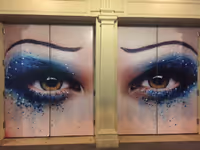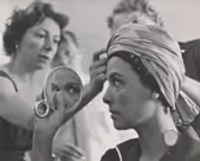Michael Riedel on behind-the-scenes diversity struggles on Broadway
#1Michael Riedel on behind-the-scenes diversity struggles on Broadway
Posted: 1/24/22 at 11:53am
Riedel has a new column in Graydon Carter's Air Mail, which can be read for free. As always, Riedel should be taken with a grain of salt. But...
The reluctance to sink time and money into these resources is not a surprise to those of us in and around the theatre world. Especially when money is tight, as is the case with all but the biggest hit shows. And even some of those are bleeding money right now.
As with other things in the theatre, it's hard to justify spending money on things that have little impact on box office performance or onstage quality. Obviously you don't want a Jagged Little Pill situation, but the majority of shows have never had anything close to that.
“I’m in favor of much of what we’re trying to do,” says a producer. “But it’s costly. The challenge is to figure out a new financial model. If shows can’t afford to run, everybody’s out of a job.”
The cost of diversity coaches, intimacy coaches (you can’t have an onstage kiss without an intimacy coach monitoring every quiver of a lip), and diversity-training modules adds up as well. Hit shows such as Hamilton, Wicked, and The Lion King can afford it. But smaller shows—and struggling nonprofit theaters—are feeling the pinch.
“All of these things cost thousands of dollars,” says the head of a small nonprofit. “I had to spend $1,000 to create a ‘healing space.’ We don’t have any money as it is. I’m trying to get shows on, but I’m spending 40 percent of my time on human resources.”
Theaters are paying “diversity dramaturges” to vet scripts to make sure they don’t contain insensitive language or offensive stereotypes, a development that rattles some writers. “You can’t write with the idea that someone is looking over your shoulder,” says a writer who is not white but who is writing about cultures other than his own. “This is impinging on the creative process.”
#2Michael Riedel on behind-the-scenes diversity struggles on Broadway
Posted: 1/24/22 at 12:08pm
“You can’t write with the idea that someone is looking over your shoulder"
You mean like an editor? Or an audience?
What a ridiculous stance.
The proofreading process for any piece of writing must include having a bouncing board for how things will be received. If something is insensitive and needs to be changed, better to catch it before it’s in front of an audience. If it’s insensitive and the writer wants to keep it, that’s their prerogative, and they can deal with the consequences and/or find a producer who will accept the script as-is.
Any proofreader should be scanning for this kind of thing anyway, the only difference is that now the proofreader is specifically equipped for it.
#3Michael Riedel on behind-the-scenes diversity struggles on Broadway
Posted: 1/24/22 at 12:20pm
As always there has to be a balance –– of course there should be a dialogue between the producer, director, and writer, and feedback should be considered from audiences and workshops. But the larger issue comes when producers bring in committees of people to weigh in on the creative process (dramaturgs, co-producers, consultants, etc) with inconsistent or prescriptive ideas.
Writers who are hired to do a job get the feeling of being strong-armed or micromanaged by a committee. Which leads to the snarky response of "why hire this writer in the first place, just have the notes committee write it."
In the theatre, the writer has control. This method brings it a little closer to the film world, where a writer can be rewritten, removed, or replaced at any moment, and arbitrators determine who gets the credit.
#4Michael Riedel on behind-the-scenes diversity struggles on Broadway
Posted: 1/24/22 at 2:01pm
I must've forgotten the "ending the relationship with the NYPD and hire private security" part of WSYWAT. While I agree with a lot of what that organization said, there's parts like this that are stupefying.
I've maintained that at the moment we're in a moment of overcorrection on Broadway. (See: seven plays by Black writers on at the same time when the market was never deep enough to sustain them.) It's probably good that we are overcorrecting for the moment, to set an example for the rest of theatre industry nationally, but I do agree with the other in the article that say we need to find a middle ground. And I'm sure we will, though I think the biggest challenge will always be with the unions.
"Hey little girls, look at all the men in shiny shirts and no wives!" - Jackie Hoffman, Xanadu, 19 Feb 2008
#5Michael Riedel on behind-the-scenes diversity struggles on Broadway
Posted: 1/24/22 at 2:09pm
Yes, a middle ground is key. The goal of WSYWAT seemed to be "ask for a lot in the hopes that we get like 30% of what we asked for."
The NYPD bit is ridiculous, especially for theatres in the middle of Times Square where the sidewalks are shared with so much foot traffic. (And any private firm would probably be entirely made up of ex-cops, and would serve the exact same function...except it would cost even more.)
#6Michael Riedel on behind-the-scenes diversity struggles on Broadway
Posted: 1/24/22 at 2:18pm
ErmengardeStopSniveling said: "Yes, a middle ground is key. The goal of WSYWAT seemed to be "ask for a lot in the hopes that we get like 30% of what we asked for."
The NYPD bit is ridiculous, especially for theatres in the middle of Times Square where the sidewalks are shared with so much foot traffic. (And any private firm would probably be entirely made up of ex-cops, and would serve the exact same function...except it would cost even more.)"
Reminds me of the recent Pride organization kerfuffle where they have NYPD being banned, and instead wanted private security. And like you say, it's all ex- or off-duty cops.
"Hey little girls, look at all the men in shiny shirts and no wives!" - Jackie Hoffman, Xanadu, 19 Feb 2008
#7Michael Riedel on behind-the-scenes diversity struggles on Broadway
Posted: 1/24/22 at 2:25pm
I agree! We need a middle ground. We are all adults and don't need so much hand holding.
#8Michael Riedel on behind-the-scenes diversity struggles on Broadway
Posted: 1/24/22 at 2:46pm
I’m very glad he wrote this article.
It’s certainly laughable to think the industry will ever be completely equitable or fair. There is never going to be a time where who you know or what your last name is won’t affect whether you’re cast or unemployed, for example. It’s a business, and business is cold.
I’m sure a lot of industry veterans would like to speak out in a similar vein, but are afraid of being ostracized, canceled or misperceived. This explains so many speaking on the condition of anonymity. Some of them have had whole careers that have served as unofficial diversity training. I can understand being resentful when you’re 70 years old and someone half your age comes in to lecture you for hours about proper diversity protocol.
The aim of increasing diversity is important and necessary, but they shouldn’t legislate - either officially or not - what artists are allowed to create. That is dangerous for all of us.
Hopefully we will find that middle ground. Evolving is always a bumpy process.
Feb. 28 - Looped, Feb. 28 - Next to Normal, March 4 - Hair, March 11 - A Little Night Music, March 24 - Time Stands Still, April 6 - La Cage Aux Folles, April 10 - Anyone Can Whistle (City Center), April 10 - Looped, May 9 - Enron, May 15 - A Little Night Music, May 15 - A Behanding In Spokane, May 30 - A Behanding In Spokane, May 30 - A Little Night Music, June 20 - A Little Night Music, June 23 - Red, June 23 - Sondheim on Sondheim, July 13 - A Little Night Music, July 18 - The Grand Manner (Lincoln Center)
#9Michael Riedel on behind-the-scenes diversity struggles on Broadway
Posted: 1/24/22 at 2:56pm
“All of these things cost thousands of dollars,” says the head of a small nonprofit. “I had to spend $1,000 to create a ‘healing space.’ We don’t have any money as it is. I’m trying to get shows on, but I’m spending 40 percent of my time on human resources.”
Jesus Christ. Grown ass adults can choose to leave if we don't care for something. The iron grip hand holding is not necessary and I will say that most actors probably don't need it either.
#10Michael Riedel on behind-the-scenes diversity struggles on Broadway
Posted: 1/24/22 at 2:58pm
Like most things, we're only listening to the loudest voices in the room instead of what we actually need.
#11Michael Riedel on behind-the-scenes diversity struggles on Broadway
Posted: 1/24/22 at 3:02pm
RippedMan said: "Like most things, we're only listening to the loudest voices in the room instead of what we actually need."
Precisely. That’s inherently lopsided. The most strident and confident among us are frequently narcissistic, and they are not always right, in spite of what they think.
Feb. 28 - Looped, Feb. 28 - Next to Normal, March 4 - Hair, March 11 - A Little Night Music, March 24 - Time Stands Still, April 6 - La Cage Aux Folles, April 10 - Anyone Can Whistle (City Center), April 10 - Looped, May 9 - Enron, May 15 - A Little Night Music, May 15 - A Behanding In Spokane, May 30 - A Behanding In Spokane, May 30 - A Little Night Music, June 20 - A Little Night Music, June 23 - Red, June 23 - Sondheim on Sondheim, July 13 - A Little Night Music, July 18 - The Grand Manner (Lincoln Center)
#12Michael Riedel on behind-the-scenes diversity struggles on Broadway
Posted: 1/24/22 at 3:37pm
WSYWAT comes from a well-intended place, but it's going to take time and proper negoatiation with the unions, League, and LORT (because so many shows are incubated off-b and regionally) to make real lasting change and find the "happy medium".
I think we'll find that these newly-hired "Artistic Consultants" will quickly feel burnout at the nonprofits (unless they're being overpaid), because they don't have much actual power –– the primary purpose of having Ruben at MTC or Kenny at Roundabout or Liliana at LCT is to have someone who isn't white to consult with and give ideas, but the final decisions still come down to the Artistic Director. And it SHOULD come from the AD.
Basically, don't hamper the artistic process with micromanagement. That will just lead to burnout, and some shows won't get produced if it's just going to be too much of a headache to do it well. (Every producer dealing with a play about "issues" is probably fearful that they have another Jagged Little Pill or Tootsie on their hands –– not that the discourse alone closed those shows, but it didn't help.) Trying to do TOO much "kumbaya" stuff becomes cloying for the company, and looks disingenuous if they try to generate press or social coverage from it.
#13Michael Riedel on behind-the-scenes diversity struggles on Broadway
Posted: 1/24/22 at 3:49pm
it sounds like each and every actor has to go through the same or similar diversity training with each new production they participate in?
#14Michael Riedel on behind-the-scenes diversity struggles on Broadway
Posted: 1/24/22 at 3:58pm
Wick3 said: "it sounds like each and every actor has to go through the same or similar diversity training with each new production they participate in?"
That doesn't sound like a bad thing to me –– repetition doesn't hurt, and most actors aren't going to have the luxury of jumping from one show to the next. But I would hope there's input from the creative team on how each production is specifically handling things related to its "workplace culture" and harassment policy.
Not sure how this is handled for readings (which could be as short as one day) or workshops (which could last multiple weeks and are basically a full rehearsal process without tech).
pmensky
Broadway Star Joined: 7/18/11
#15Michael Riedel on behind-the-scenes diversity struggles on Broadway
Posted: 1/24/22 at 4:30pm
I disagree that employees should have to go through these trainings for each contract. If you can get certified for CPR after four hours of training, you should be able to get certified in sexual harassment and/or diversity training for the same amount of time, and be done with it. Also, I also think the unions should provide these one-time trainings with all unions agreeing on the syllabus for that training seminar. The unions control so much of what goes on during the production process. This would just be another set of rules added to all the bargaining agreements.
#16Michael Riedel on behind-the-scenes diversity struggles on Broadway
Posted: 1/24/22 at 4:51pm
There's probably a lot of people in this world who couldn't do CPR successfully, even after 4 hours of training...
I would almost guarantee that every person who has harassed someone has done some sort of anti-harassment training in their lifetime (and same with people who've done bias training or diversity training). In this new world, many workplaces require it annually (such as higher education institutions) or at the very start of a new employee's time with the company.
It's one of those things that could have a major impact with just a half day devoted to it at the start of each proper contract. But as we know from recent events, sometimes even that isn't enough.
pmensky
Broadway Star Joined: 7/18/11
#17Michael Riedel on behind-the-scenes diversity struggles on Broadway
Posted: 1/24/22 at 4:59pm
ErmengardeStopSniveling said: "There's probably a lot of people in this world who couldn't do CPR successfully, even after 4 hours of training...
I would almost guarantee that every person who has harassed someone has donesomesort of anti-harassment training in their lifetime (and same with people who've done bias training or diversity training). In this new world, many workplaces require it annually (such as higher education institutions) or at the very start of a new employee's time with the company.
It's one of those things that could have a major impact with just a half day devoted to it at the start of each proper contract. But as we know from recent events, sometimes even that isn't enough."
Your first two paragraphs basically say that the training is irrelevant because people won’t absorb the training or already have or will commit misconducts anyway, then your third paragraph says it’s important and “could have a major impact?” You make as much sense as taking several hours of rehearsal time away for something that could be complete beforehand in an online seminar with an exam.
#18Michael Riedel on behind-the-scenes diversity struggles on Broadway
Posted: 1/24/22 at 5:31pm
New York has a standardized online course with a gender-awareness and harassment training. Once you complete it, you get a certificate of completion, which has (I believe) a 1 year expiration date. Within that year, you can present the certificate to any employer that requires the training. Once that year is up, you have to take the training course again when beginning a new contract that requires it. I've taken the course 2 or 3 times now, and I find it helpful to have a refresher (there's good information in there, not just to prevent harassment, but also guidelines on what to do when you witness it, what to do if it happens to you, and other resources, etc.).
Seems like there could be something similar focusing more closely on race, and/or more specific to a show-business setting. And seems like an easy fix for the "how often?" and "how expensive?" debates going on in this thread.
ivorylawrance
Swing Joined: 11/14/22
#19Michael Riedel on behind-the-scenes diversity struggles on Broadway
Posted: 11/14/22 at 5:21pm
interesting theme...
#20Michael Riedel on behind-the-scenes diversity struggles on Broadway
Posted: 11/14/22 at 5:26pm
JBroadway said: "“You can’t write with the idea that someone is looking over your shoulder"
You mean like an editor? Or an audience?
What a ridiculous stance.
The proofreading process for any piece of writing must include having a bouncing board for how things will be received. If something is insensitive and needs to be changed, better to catch it before it’s in front of an audience. If it’s insensitive and the writer wants to keep it, that’s their prerogative, and they can deal with the consequences and/or find a producer who will accept the script as-is.
Any proofreader should be scanning for this kind of thing anyway, the only difference is that now the proofreader is specifically equipped for it."
I'd say that is an even more ridiculous response, as what he's complaining about has zero to do with editing or proofreading and involves censorship and the stifling of "troublesome" subjects or characters out of a fear of controversy.
PipingHotPiccolo
Broadway Legend Joined: 6/13/22
#21Michael Riedel on behind-the-scenes diversity struggles on Broadway
Posted: 11/14/22 at 6:42pm
President Obama has more than once referred to the progressive firing squad circle, where in the name of doing something positive, they wind up shooting each other down.
We want MORE small, creative, risky productions on Broadway yes? So lets make it absolutely cost-prohibitive, and alienate as many people as possible in the process! Where can we go wrong?
#22Michael Riedel on behind-the-scenes diversity struggles on Broadway
Posted: 11/15/22 at 8:45am
Middle ground, yes. Do you know how hard it would be for Mickey and Judy to throw a show together in a barn thes days?!
#23Michael Riedel on behind-the-scenes diversity struggles on Broadway
Posted: 11/15/22 at 12:02pm
fashionguru_23 said: "Middle ground, yes. Do you know how hard it would be for Mickey and Judy to throw a show together in a barn thes days?!"
"Judy, honey, you sound beautiful but we really have to cut the minstrel number. It just won't go over with this crowd"
ViniFromBrazil
Stand-by Joined: 1/26/16
#24Michael Riedel on behind-the-scenes diversity struggles on Broadway
Posted: 11/15/22 at 1:45pm
Intimacy coaches and Diversity Programs seem to be very new and recent concepts that have not created a high demand in order to have stabilized costs and competition.
What is not new, I think, is the problem of having actors and other production members suing your production or doing an exposé due to unprepared, dangerous or malicious material or personnel.
Coming from a country where artistic service is severely underpaid and undervalued, I can't help but wonder if this piece is a result of the "I just don't want to pay for it" mentality. Has anyone recently read a piece (not from Riedel, I imagine) of the good effect these professionals have brought to a specific production? It would make me less suspicious if the article had a balanced examination of this new way of producing art.
BETTY22
Broadway Legend Joined: 12/29/13
#25Michael Riedel on behind-the-scenes diversity struggles on Broadway
Posted: 11/15/22 at 5:18pm
Is it terrible to admit - I MISS HIM?
Page 6 is fantastic at covering theatre gossip, but I do miss a single column devoted just to theatre dish.
Videos











